Are you curious about the exact number of calories in a mini banana? Join me as we uncover the truth behind this popular snack’s calorie count.
- The calorie content of a mini banana can vary depending on its size.
- On average, a medium-sized banana contains about 105 calories.
- However, the calorie count can range from 72 to 135 calories depending on the size of the banana.
- Bananas are mainly composed of carbohydrates, with about 93% of their calories coming from carbs.
- The carb content of a mini banana ranges from 19 to 35 grams.
Additionally, bananas contain beneficial nutrients such as fiber, vitamin B6, vitamin C, manganese, potassium, and folate. Unripe bananas contain more resistant starch, which is a type of indigestible carbohydrate that feeds friendly gut bacteria and provides energy to the body. Overall, bananas are a tasty and nutritious snack with relatively low calories and a good source of essential vitamins and minerals.
The Average Calorie Content of a Mini Banana
On average, a medium-sized mini banana contains approximately 105 calories and provides various essential nutrients. However, it’s important to note that the calorie count of a mini banana can vary depending on its size. Mini bananas come in different sizes, with the calorie count ranging from 72 to 135 calories.
Mini bananas are primarily composed of carbohydrates, which make up about 93% of their calorie content. The carbohydrate content of a mini banana can range from 19 to 35 grams. These carbs provide the body with energy and are an important source of fuel for daily activities.
In addition to being a good source of carbs, mini bananas also boast several beneficial nutrients. They contain dietary fiber, which aids in digestion and promotes a healthy gut. Mini bananas are rich in vitamins such as vitamin B6 and vitamin C, which play crucial roles in supporting overall health. They also provide minerals like potassium, which is essential for maintaining proper heart and muscle function, and manganese, which supports bone health.
Furthermore, unripe bananas contain higher levels of resistant starch, a type of indigestible carbohydrate. This resistant starch acts as a prebiotic, nourishing the beneficial bacteria in your gut and promoting a healthy digestive system. The resistant starch also provides a slower release of energy, keeping you feeling fuller for longer.
In conclusion, mini bananas are not only a delicious and convenient snack option, but they also offer a range of essential nutrients. With relatively low calories and a good source of vitamins, minerals, and fiber, mini bananas can be a nutritious addition to any diet.
Understanding the Size Variation
The calorie count in a mini banana can differ depending on its size, ranging from 72 to 135 calories. It’s important to consider the size when calculating the calorie content of a mini banana, as larger bananas tend to have more calories compared to smaller ones.
Here’s a breakdown of the calorie content based on different sizes of mini bananas:
| Size | Calories |
|---|---|
| Extra Small (4-5 inches) | 72-85 |
| Small (5-6 inches) | 86-100 |
| Medium (6-7 inches) | 101-115 |
| Large (7-8 inches) | 116-135 |
As you can see, the size of a mini banana can significantly affect its calorie count. It’s important to keep this in mind when planning your meals or tracking your calorie intake.
How to Determine the Size
Measuring the size of a mini banana is relatively simple. Start by holding the banana against a ruler or tape measure. The size of the banana is determined by measuring the length from the stem to the base of the fruit. By comparing the size to the measurements in the table above, you can get a rough estimate of the calorie content.
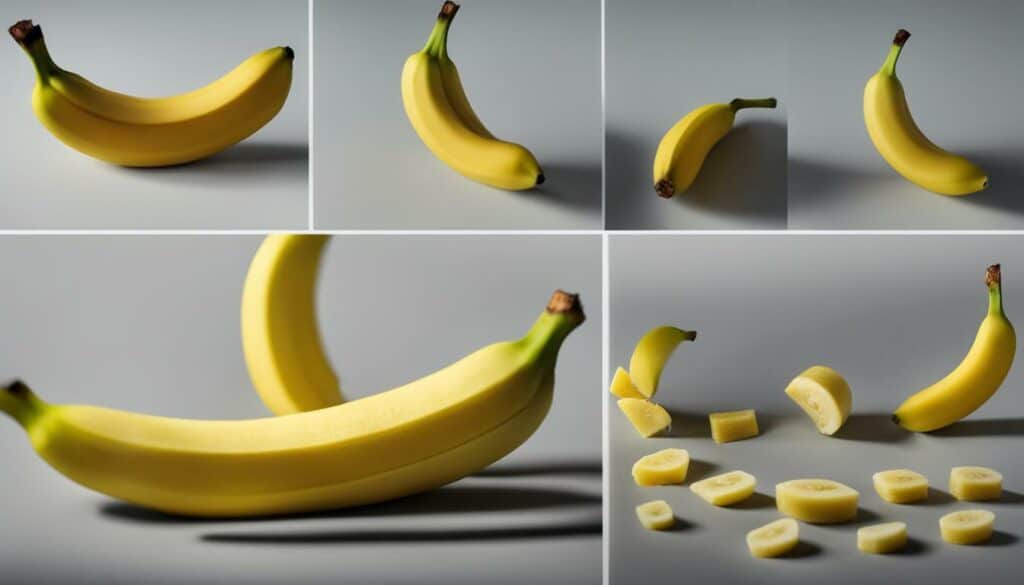
Remember, mini bananas come in various sizes, so it’s essential to be mindful of the calorie differences when incorporating them into your diet. Whether you prefer smaller or larger mini bananas, they can still be a healthy and delicious snack option.
Carbohydrate Content in Mini Bananas
Mini bananas are primarily composed of carbohydrates, with approximately 93% of their calories deriving from carbs. This makes them a rich source of energy and a perfect choice for individuals seeking a quick and natural boost throughout the day. The carb content in mini bananas can vary depending on the size, with smaller bananas containing around 19 grams of carbohydrates, while larger ones can have up to 35 grams.
Carbohydrates, often misunderstood and associated with weight gain, are actually an essential component of a well-balanced diet. They provide your body with the necessary fuel to function properly and support daily activities. The carbs found in mini bananas are primarily in the form of natural sugars, including fructose, which is easily digested and absorbed by the body.
In addition to providing energy, the carbohydrates in mini bananas also contribute to their naturally sweet and delicious taste. They make mini bananas a convenient and satisfying snack option, perfect for curbing hunger and maintaining a stable blood sugar level throughout the day. So, the next time you’re looking for a healthy and tasty snack, reach for a mini banana to satisfy your cravings while nourishing your body with essential carbohydrates.

As with any food, portion control is important when enjoying mini bananas. While they offer a range of nutritional benefits, it is essential to incorporate them into a well-rounded diet alongside other fruits, vegetables, proteins, and fats. By doing so, you can ensure that you’re getting a wide variety of essential vitamins, minerals, and nutrients to support your overall health and well-being.
In summary, mini bananas are a delicious and nutrient-packed snack option, with the majority of their calories coming from carbohydrates. They provide an excellent source of natural sugars that can help fuel your body and keep you energized throughout the day. So, grab a mini banana whenever you need a quick and wholesome pick-me-up, and enjoy the tasty benefits it has to offer!
Essential Nutrients in Mini Bananas
In addition to calories, mini bananas are a rich source of essential nutrients, including fiber, vitamin B6, vitamin C, manganese, potassium, and folate. These nutrients contribute to the overall health benefits of consuming mini bananas as part of a balanced diet.
Fiber is an important component of mini bananas, supporting healthy digestion and aiding in weight management. It adds bulk to our diet, promoting feelings of fullness and reducing the risk of overeating. Furthermore, fiber plays a crucial role in regulating blood sugar levels and maintaining a healthy cholesterol level.
Vitamin B6, also known as pyridoxine, is essential for brain development, hormone production, and maintaining a healthy nervous and immune system. It is involved in the production of neurotransmitters such as serotonin, which contributes to our mood and overall well-being.
| Nutrient | Amount per serving |
|---|---|
| Fiber | 2 grams |
| Vitamin B6 | 0.4 milligrams |
| Vitamin C | 9 milligrams |
| Manganese | 0.3 milligrams |
| Potassium | 200 milligrams |
| Folate | 24 micrograms |
Vitamin C is an antioxidant that helps protect our cells from damage, supports collagen production for healthy skin, and enhances the absorption of dietary iron. Manganese is important for bone health, metabolism, and antioxidant function. Potassium is an electrolyte that helps maintain fluid balance, supports proper muscle function, and plays a role in maintaining healthy blood pressure levels. Lastly, folate is vital for cell division and growth, making it especially important for pregnant women or those planning to conceive.
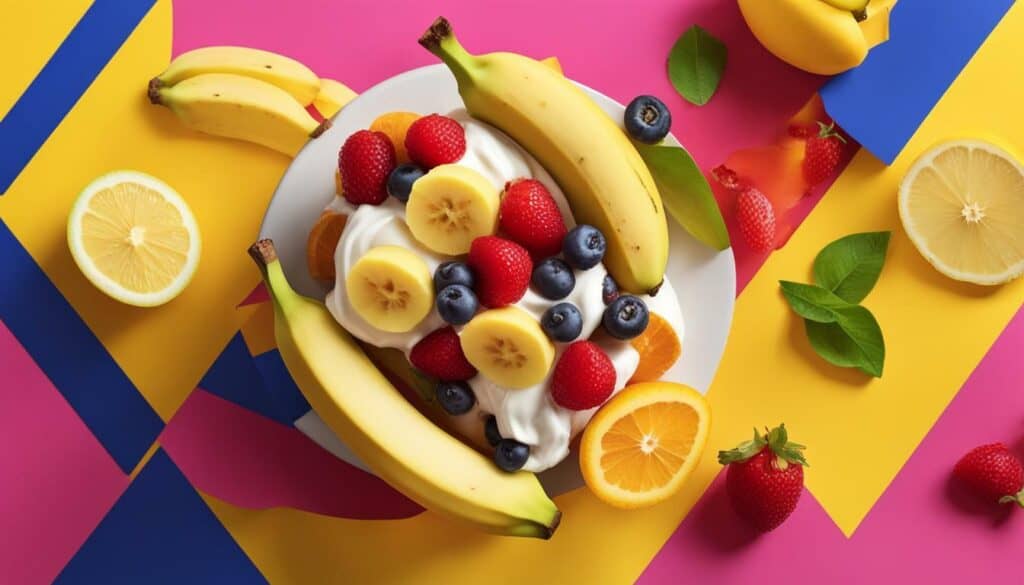
- Add mini bananas to your morning cereal or oatmeal for a natural sweetness and additional fiber.
- Blend mini bananas into smoothies for a creamy texture and a boost of essential nutrients.
- Pair mini bananas with a source of protein, such as nut butter, for a satisfying and nutritious snack.
- Slice mini bananas and freeze them for a refreshing and healthy alternative to processed frozen treats.
By incorporating mini bananas into your daily routine, you can enjoy their delicious taste while reaping the benefits of their impressive nutritional profile. Whether enjoyed on their own or incorporated into various dishes, mini bananas are a versatile and nutritious fruit that can support your overall health and well-being.
Unripe Bananas and Resistant Starch
Did you know that unripe mini bananas contain higher levels of resistant starch, providing additional health benefits? Resistant starch is a type of indigestible carbohydrate that has been shown to promote gut health and provide energy to the body. It acts as a prebiotic, feeding the friendly bacteria in our intestines and supporting a healthy digestive system.
In addition to its gut-friendly properties, resistant starch has also been linked to improved blood sugar control, increased satiety, and weight management. By consuming unripe mini bananas, you can enjoy these added benefits while indulging in a delicious and nutritious snack.
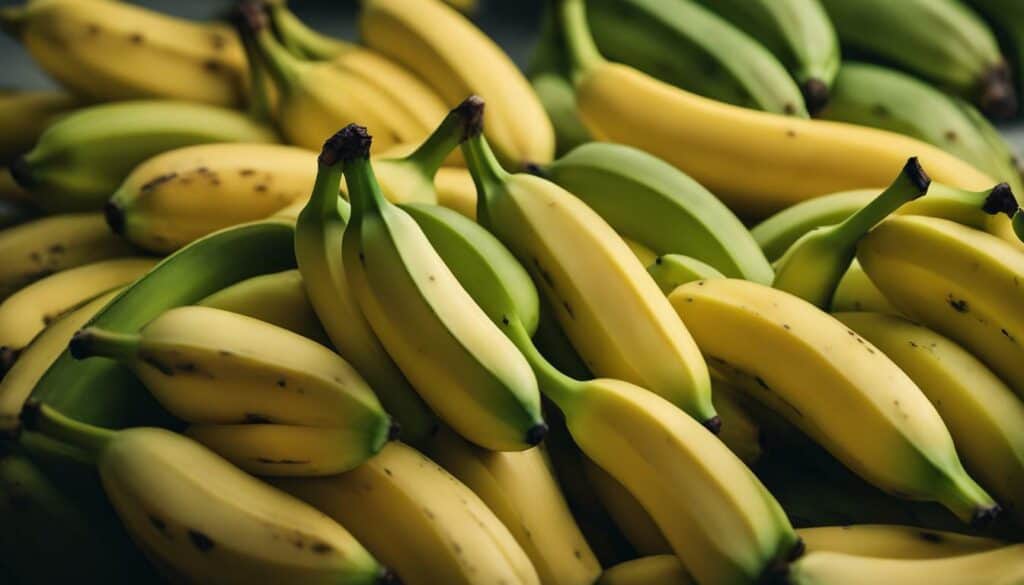
When it comes to resistant starch content, unripe mini bananas take the spotlight. As bananas ripen, their starch content is converted into simple sugars, resulting in a sweeter taste and a decrease in resistant starch levels. Therefore, if you prefer a higher resistant starch content, opt for slightly green or yellow mini bananas that are not fully ripe.
| Mini Banana Ripeness | Resistant Starch Content |
|---|---|
| Unripe (slightly green or yellow) | Higher levels |
| Ripe (yellow with brown spots) | Lower levels |
Including unripe mini bananas in your diet can be as simple as incorporating them into smoothies, adding them to oatmeal or yogurt, or enjoying them on their own. With their sweet flavor and the added nutritional benefits of resistant starch, mini bananas are a versatile and healthy option for snack time or any time.
Summary:
- Unripe mini bananas contain higher levels of resistant starch, promoting gut health and providing energy.
- Resistant starch acts as a prebiotic, nourishing friendly gut bacteria and supporting a healthy digestive system.
- Consuming unripe mini bananas can aid in blood sugar control, increase satiety, and support weight management.
- As bananas ripen, their starch content decreases, resulting in lower levels of resistant starch.
- Unripe mini bananas can be incorporated into a variety of dishes and enjoyed as a tasty and nutritious snack.
| Benefits of Unripe Mini Bananas | Resistant Starch Content |
|---|---|
| Promotes gut health | Higher levels |
| Provides energy | Higher levels |
| Aids in blood sugar control | Higher levels |
| Increases satiety | Higher levels |
| Supports weight management | Higher levels |
Mini Bananas as a Nutritious Snack
With their relatively low calorie count and rich nutrient profile, mini bananas make for a tasty and nutritious snack. These pint-sized powerhouses are packed with essential vitamins, minerals, and fiber that can support overall health and well-being.
One medium-sized mini banana contains about 105 calories. However, it’s important to note that the calorie content can vary depending on the size of the banana. Smaller mini bananas may have fewer calories, while larger ones may have slightly more. Regardless of size, mini bananas are a great option for those looking to satisfy their snack cravings without derailing their healthy eating goals.
Bananas are primarily composed of carbohydrates, with about 93% of their calories coming from carbs. A mini banana typically contains around 19 to 35 grams of carbohydrates. This makes them an excellent source of quick energy, making them an ideal snack choice for athletes or anyone needing a pre or post-workout boost.
Aside from their carbohydrate content, mini bananas also provide key nutrients such as fiber, vitamin B6, vitamin C, manganese, potassium, and folate. Fiber is essential for digestive health and can help maintain regular bowel movements. Meanwhile, vitamins and minerals like vitamin C and potassium support immune function and proper electrolyte balance, respectively.
So whether you enjoy mini bananas as a mid-morning pick-me-up or a post-dinner treat, you can feel good about reaching for this wholesome snack option. Their portable nature and naturally sweet flavor make them a convenient and satisfying choice for any time of day.

| Nutrient | Amount per Serving |
|---|---|
| Calories | 85-105 |
| Carbohydrates | 19-35 grams |
| Fiber | 2-3 grams |
| Vitamin B6 | 0.4 milligrams |
| Vitamin C | 8 milligrams |
| Manganese | 0.3 milligrams |
| Potassium | 350 milligrams |
| Folate | 24 micrograms |
The Importance of Essential Vitamins and Minerals
Mini bananas are a wonderful source of essential vitamins and minerals that support overall health and well-being. These tiny fruits pack a nutritional punch, providing a range of beneficial nutrients that contribute to a balanced diet. One serving of mini bananas contains roughly 20% of the recommended daily intake of vitamin C, which plays a crucial role in boosting the immune system and promoting the health of skin and connective tissues.
In addition to vitamin C, mini bananas are also rich in vitamin B6. This vitamin is involved in numerous bodily functions, including brain development, the production of red blood cells, and the metabolism of proteins, carbohydrates, and fats. The high vitamin B6 content found in mini bananas contributes to maintaining healthy brain function and may help reduce the risk of cognitive decline.
Furthermore, mini bananas are a great source of potassium, a mineral that is essential for maintaining proper heart function, regulating blood pressure, and supporting muscle health. Potassium also plays a vital role in promoting fluid balance within the body and is crucial for the proper functioning of nerves and muscles.
| Vitamin | Amount per Serving |
|---|---|
| Vitamin C | 20% of recommended daily intake |
| Vitamin B6 | 10% of recommended daily intake |
| Potassium | 12% of recommended daily intake |
Including mini bananas in your daily diet can help ensure you receive these essential vitamins and minerals, supporting your overall health and well-being. Whether you enjoy them on their own, add them to smoothies, or use them as a topping for yogurt, mini bananas offer a convenient and delicious way to incorporate these beneficial nutrients into your daily routine.
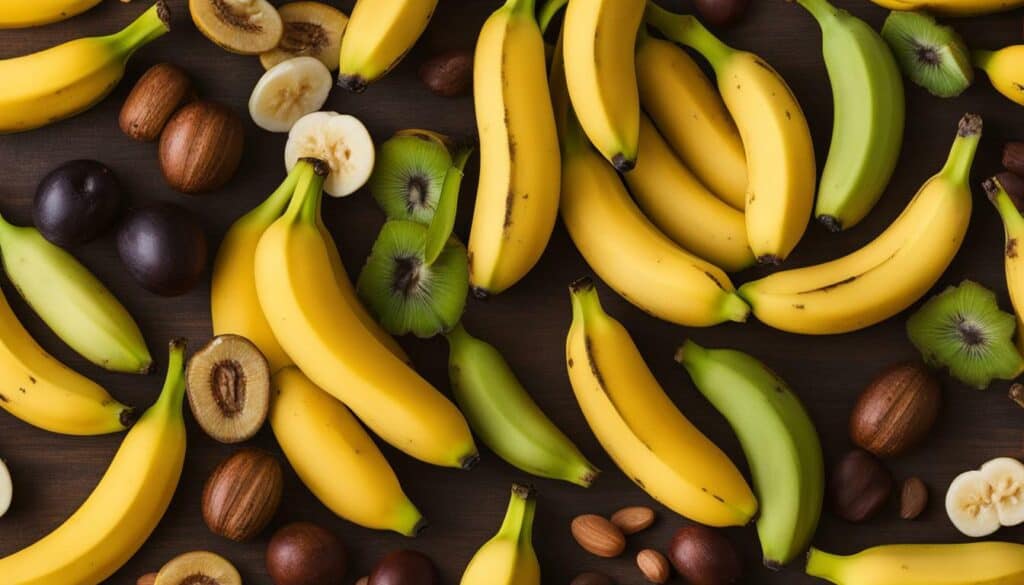
Discover creative ways to include mini bananas in your daily diet for a well-rounded and nutritious meal plan. These small but mighty fruits pack a punch when it comes to their nutritional benefits. Mini bananas are not only delicious, but they are also a versatile ingredient that can be incorporated into various dishes.
Start your day off right by adding sliced mini bananas to your morning cereal or oatmeal. They add a naturally sweet flavor and a creamy texture that pairs perfectly with grains. You can also blend mini bananas into smoothies for a refreshing and nutritious treat. Their natural sugars provide an energy boost, making them an excellent choice for a pre-workout snack.
Mini bananas can also be used to create healthy desserts. Mash them up and mix with Greek yogurt and a drizzle of honey for a simple yet satisfying dessert option. You can even freeze mini banana slices and enjoy them as a guilt-free alternative to ice cream. Their creamy texture resembles that of a frozen treat, making them a perfect snack for those hot summer days.
So next time you’re looking to add a dose of nutrition to your meals, don’t forget about the mini banana. They are not only packed with essential vitamins and minerals, but they also provide a good amount of fiber, which aids in digestion. Incorporate mini bananas into your daily diet and reap the many health benefits they offer.

- Add mini banana slices to your morning cereal or oatmeal for a naturally sweet and creamy addition.
- Blend mini bananas into smoothies for a refreshing and energizing treat.
- Mash mini bananas with Greek yogurt and honey for a simple and healthy dessert option.
- Freeze mini banana slices for a guilt-free alternative to ice cream.
By incorporating mini bananas into your daily diet, you’ll not only satisfy your cravings for something sweet and creamy but also give your body a boost of essential nutrients. So go ahead and get creative with your mini banana recipes – your taste buds and your health will thank you!
Table: Nutritional Information of Mini Bananas
| Nutrient | Amount per 100g |
|---|---|
| Calories | 90 |
| Carbohydrates | 22g |
| Fiber | 2g |
| Protein | 1g |
| Fat | 0g |
| Vitamin C | 10% of the daily recommended intake |
| Potassium | 10% of the daily recommended intake |
| Vitamin B6 | 20% of the daily recommended intake |
Conclusion
Mini bananas offer a delicious and wholesome snack option, with a calorie count that varies based on size, and they are packed with essential vitamins and minerals for a balanced diet. On average, a medium-sized mini banana contains about 105 calories, but this can range from 72 to 135 calories depending on the size. Bananas are primarily composed of carbohydrates, with about 93% of their calories coming from carbs. The carbohydrate content in a mini banana can range from 19 to 35 grams.
In addition to being a low-calorie fruit, mini bananas are also rich in beneficial nutrients. They are a great source of fiber, which aids in digestion and helps to keep you feeling full. Mini bananas also provide essential vitamins such as vitamin B6 and vitamin C, which support overall health and boost the immune system. Moreover, they contain minerals like potassium, manganese, and folate, which are vital for various bodily functions.
For those looking to incorporate mini bananas into their diet, it’s worth noting that unripe bananas are particularly beneficial. Unripe bananas contain more resistant starch, which is a type of indigestible carbohydrate that acts as a prebiotic. This means that it feeds the friendly bacteria in the gut, supporting gut health and providing a steady source of energy for the body.
Whether enjoyed as a standalone snack or incorporated into recipes and smoothies, mini bananas offer a convenient and nutritious option. With their relatively low calorie count and high nutrient content, they make for a satisfying and guilt-free choice for health-conscious individuals. So next time you’re looking for a quick and easy snack, grab a mini banana and enjoy its natural sweetness and nutritional benefits.
FAQ
Q: What is the calorie content of a mini banana?
A: The calorie content of a mini banana can vary depending on its size. On average, a medium-sized banana contains about 105 calories. However, the calorie count can range from 72 to 135 calories depending on the size of the banana.
Q: What is the carbohydrate content of a mini banana?
A: Mini bananas are mainly composed of carbohydrates, with about 93% of their calories coming from carbs. The carb content of a mini banana ranges from 19 to 35 grams.
Q: What nutrients are found in mini bananas?
A: Mini bananas contain beneficial nutrients such as fiber, vitamin B6, vitamin C, manganese, potassium, and folate.
Q: Do unripe bananas have any nutritional benefits?
A: Yes, unripe bananas contain more resistant starch, which is a type of indigestible carbohydrate that feeds friendly gut bacteria and provides energy to the body.
Q: Are mini bananas a healthy snack option?
A: Yes, mini bananas are a tasty and nutritious snack with relatively low calories. They are a good source of essential vitamins and minerals.
Q: How should I incorporate mini bananas into a healthy diet?
A: Mini bananas can be enjoyed on their own as a quick snack, added to smoothies or yogurt, or used as a natural sweetener in baked goods.
How Many Calories Are in Salted Peanuts Compared to a Mini Banana?
When it comes to snacking, calories in salted peanuts explained: a 1-ounce serving typically contains around 160 calories. In comparison, a mini banana contains approximately 90 calories. While both options offer nutrients, peanuts tend to be higher in calories due to their fat content. Ultimately, portion control is key to maintaining a balanced diet.

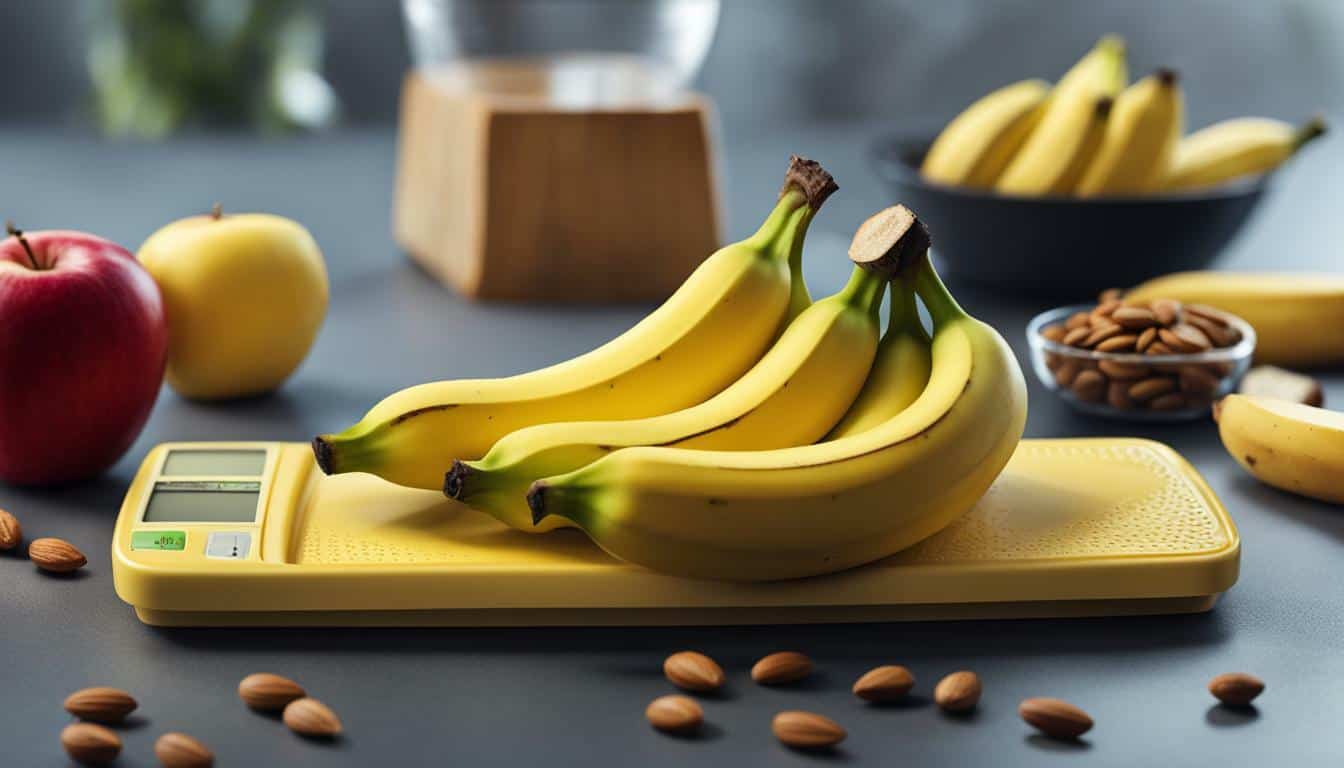



Leave a Reply